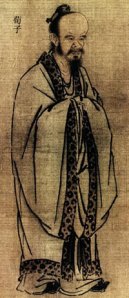Xunzi (荀子)
 Xunzi, also named Xun Kuang, was born in the State of Zhao in the Warring States Period (475-221BC). He traveled from his native Zhao to the state of Qi when only fifteen to pursue his studies. Soon he became a well-recognized scholar and rose to official posts, including that of magistrate.
Xunzi, also named Xun Kuang, was born in the State of Zhao in the Warring States Period (475-221BC). He traveled from his native Zhao to the state of Qi when only fifteen to pursue his studies. Soon he became a well-recognized scholar and rose to official posts, including that of magistrate.
Xunzi developed a new version of Confucianism in the period 298-238BC. He can be contrasted with the other great follower of Confucius, Mencius, who saw people as inherently good and governed by a moral sense. Active in the time of instability and disruption in Chinese history known as the Warring States, Xunzi saw people as having an inherently evil nature that required control by education, ritual and custom. His pupil, Han Feizi developed this philosophy further by elevating law to a position of supreme importance in governing human affairs. Han Feizi’s presumed influence on the Emperor Qinshihuang, the first emperor of the Qin Dynasty (221-206BC), in such activities as cruel punishments and the attempt to destroy China’s past by the burning of books, left a negative impression that reflected back on his teacher. As a result, the work of Mencius for many centuries received much more attention than that of Xunzi.
Xunzi developed his theories in a logical manner in his master piece Xunzi of some 32 chapters. These might be regarded as the first collection of philosophical essays in China — as distinct from fragments (analects) or records of conversations.